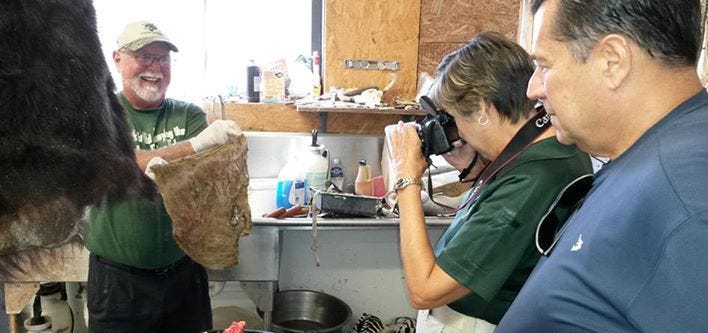
Safety Tips
• If you encounter an alligator over four feet in length that poses a threat to humans or property, call the FWC’s Nuisance Alligator Hotline, toll-free at 1-866-FWC-GATOR (392-4286). The
FWC will evaluate your complaint, and if warranted, send a contracted nuisance alligator trapper
to remove the animal.
• Be aware of the possible presence of alligators when in or near fresh or brackish water. Negative alligator encounters may occur when people do not pay close attention to their surroundings when working or recreating near water.
• Closely supervise children when they are playing in or around water. Never allow small children to play unsupervised near water.
• Do not swim outside of posted swimming areas or in waters that might be inhabited by large
alligators.
• Alligators are most active between dusk and dawn. Therefore, swim only during daylight hours.
• Do not allow pets to swim, exercise or drink in or near waters that may contain alligators or in
designated swimming areas with humans. Dogs are more susceptible to being bitten than humans, because dogs resemble the natural prey of alligators. The sound of dogs barking and playing may draw an alligator to the area.
• Never feed or entice alligators – it is dangerous and illegal. When fed, alligators overcome their
natural wariness and associate people with food.
• Inform others that feeding alligators is illegal and creates problems for others who want to use the water for recreational purposes.
• Dispose of fish scraps in garbage cans at boat ramps and fish camps – do not throw them in the
water. Although you are not intentionally feeding alligators when you do this, the end result can
be the same.
• Observe and photograph alligators only from a safe distance. Remember, they are an important
part of Florida’s natural history as well as an integral component of freshwater ecosystems.
• Leave alligators alone. State law prohibits killing, harassing or possession of alligators except
under permit.
• Never remove an alligator from its natural habitat or accept one as a pet. It is illegal and
dangerous to do so. Handling even small alligators can result in injury.
• If an alligator bites you, the best thing you can do is fight back, making as much noise and
commotion as possible. Hitting or kicking the alligator, or poking it in its eyes may cause it to
release its grip. When alligators seize prey they cannot easily overpower, they will often let go
and retreat.
• Seek immediate medical attention if bitten by an alligator. Alligator bites often result in serious
infection.
This article originally appeared on Santa Rosa Press Gazette: Safety Tips regarding alligators
